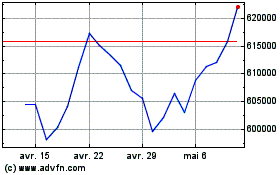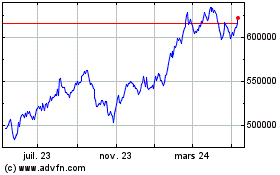By Nicole Friedman
Warren Buffett has one man to thank for Berkshire Hathaway
Inc.'s $29 billion windfall in 2017: President Donald Trump.
The Omaha billionaire backed Mr. Trump's opponent Hillary
Clinton during the 2016 presidential campaign. But new tax cuts the
president signed into law last December provided Berkshire with the
sizable one-time gain that helped inflate annual profits to nearly
$45 billion.
Other American corporations like AT&T Inc. and Comcast Corp.
also booked large paper gains as a result of the new tax
legislation.
Mr. Buffett, Berkshire's chairman and a Democrat, expressed
reservations last year about the need for corporate tax cuts. But
he also said any drop in corporate taxes would benefit many of
Berkshire's businesses and its shareholders.
"I got a million shareholders at Berkshire Hathaway. And they
would all love to see a corporate tax cut," he said on CNBC in
October. But, he added, "we have a lot of businesses, 60 or 70. I
don't think any of them are noncompetitive in the world because of
the corporate tax rate."
When asked on CNBC in January if he would have voted for the new
tax law, Mr. Buffett demurred: "I would have had a different bill
myself."
The tax changes lowered Berkshire's estimate of how much it
would have to pay in taxes if it sold the stock investments it
currently holds. Berkshire has around $100 billion in unrealized
gains on equity investments, Mr. Buffett has said, and those gains
are now expected to be taxed at a 21% rate, down from 35%.
The immediate net windfall for Berkshire was $29 billion, which
helped push Berkshire's net earnings to $44.94 billion in 2017 from
$24.07 billion the prior year while offsetting declines in certain
businesses. Berkshire's operating earnings fell 18%, from $17.6
billion in 2016 to $14.5 billion in 2017, as hurricanes and other
catastrophes caused losses in the company's insurance
operations.
Berkshire's book value per share rose 23% in 2017, the company
said, compared with a 22% total return in the S&P 500,
including dividends. Its overall net worth increased by $65
billion, $29 billion from the tax benefits and $36 billion from
operations.
Mr. Buffett said in a letter released to shareholders Saturday
that the increase in the company's net worth was "real" but "a
large portion of our gain did not come from anything we
accomplished at Berkshire."
The annual letter from Mr. Buffett is widely read by investors
and analysts. This year, the 16-page document was shorter than
usual and left out some of Mr. Buffett's usual themes on the
economy and the future prospects of the U.S.
"This is a company that would like to hold itself up as having a
superior business model and a superior strategy, yet the bump from
the results came from something that was not their doing," said
Cathy Seifert, equity analyst at CFRA Research. "It was a very
subdued letter."
The tax gain is the latest example of how Berkshire has
benefited from Trump's election. The company's stock price climbed
in the months following the election on the expectation that
reduced taxes and regulations would boost Berkshire's businesses,
which range from a railroad and utilities to industrial
manufacturers and retailers.
Mr. Buffett also said last year that the company planned to sell
some of its losing stock investments in 2017, when they would be
more advantageous from a tax perspective. Berkshire sold shares of
International Business Machines Corp. throughout 2017 and sharply
lowered its IBM stake in the fourth quarter.
However, at Berkshire's annual meeting last May, Mr. Buffett
said rising health-care costs were a bigger threat to the
competitiveness of U.S. companies than taxes. Berkshire joined
Amazon.com Inc. and JPMorgan Chase & Co. in January to form a
new company to figure out how to reduce health-care costs for their
employees. The company is in the early stages of planning, and Mr.
Buffett didn't write about it in his letter.
He did address the conglomerate's growing cash pile and lamented
the lack of well-priced acquisition opportunities. Berkshire's
cash, which is mostly invested in Treasury bills, ballooned to a
record $116 billion at year-end.
"We will need to make one or more huge acquisitions," Mr.
Buffett wrote in his letter. Prices for businesses were too high
for his taste in 2017, he said, but "our smiles will broaden when
we have redeployed Berkshire's excess funds into more productive
assets."
In October, Berkshire took a 38.6% stake in truck-stop company
Pilot Travel Centers LLC, which will increase to an 80% stake in
2023. But two potential large deals fell through last year. Kraft
Heinz Co. dropped a $143 billion offer, which would have been
partly backed by Berkshire, for Unilever PLC. And Texas
power-transmission company Oncor terminated a deal with Berkshire's
utility arm in favor of a higher offer from Sempra Energy.
Some of Berkshire's 60-odd subsidiaries completed acquisitions,
but those deals tend to be small. Berkshire spent $2.7 billion on
bolt-on acquisitions in 2017, the company said, up from $1.4
billion the prior year.
Mr. Buffett also avoided giving any new hints about his
succession planning after promoting two executives to vice chairmen
last month.
He reiterated his advice that individuals should invest
passively and avoid high money management fees while discussing the
final tally from his bet that an S&P 500 index fund would
outperform a basket of hedge funds over a decade.
Write to Nicole Friedman at nicole.friedman@wsj.com
(END) Dow Jones Newswires
February 24, 2018 13:57 ET (18:57 GMT)
Copyright (c) 2018 Dow Jones & Company, Inc.
Berkshire Hathaway (NYSE:BRK.A)
Graphique Historique de l'Action
De Mar 2024 à Avr 2024

Berkshire Hathaway (NYSE:BRK.A)
Graphique Historique de l'Action
De Avr 2023 à Avr 2024
